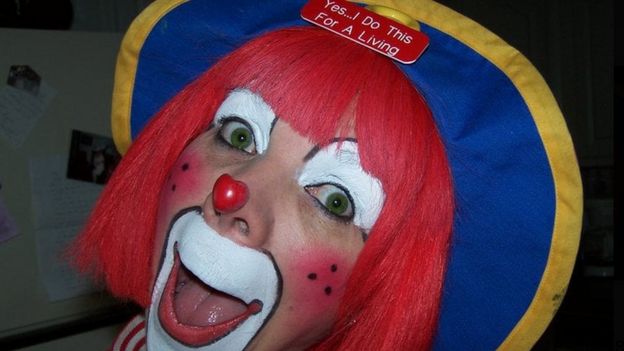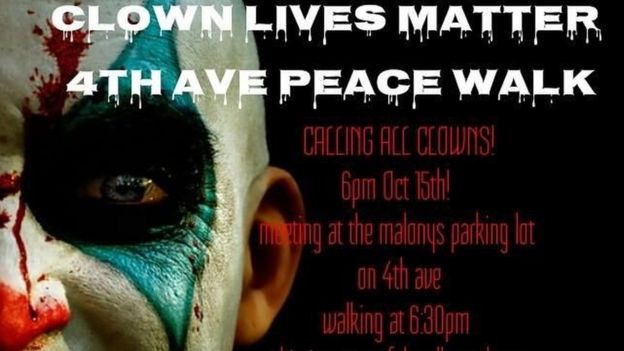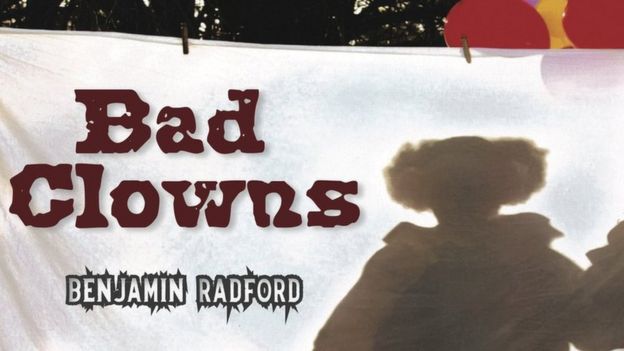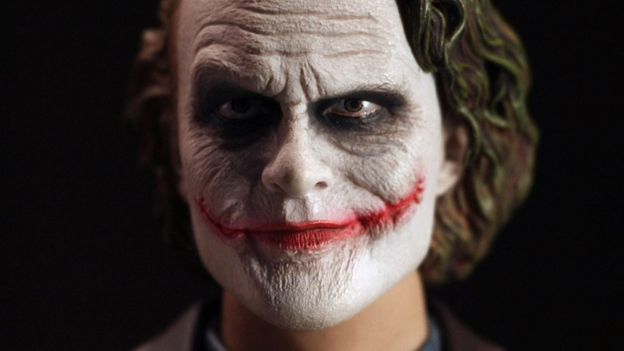
This article is more than
10 year old"It's my full-time job. It's what I do for a living," says Fudgie the Clown, a New Jersey native. "I have been a professional clown for 34 years now - but this is ruining my business.
"I am not getting the phone calls. And it's not only me. My clown friends too. I'm checking with them: 'is the phone ringing? No, my phone is not ringing'."
Not only that, she is beginning to fear for her safety.
"The police know me in my home town. But I get a little bit nervous if I have to go out of my comfort zone. I haven't been pulled over but I do drive in clown make-up. Everyone's on the alert now."
It is a strange turn of events for someone who sees it as her job is to make people smile.
"Clowns make a lot of people happy," she says. "It's nice to be made to smile and laugh. And that's what we do, but unfortunately it has taken a turn for the worst."
The current clown panic began in August, in Greenville, South Carolina, with locals reporting people dressed in fright wigs and full clown make-up trying to lure children into the woods.
It rapidly caught fire on social media and before long there were sightings all across the United States, and, more disturbingly, reports of violent attacks by men in clown masks, armed robberies and schools and other public buildings going into lockdown after threats from "clowns".

The profession has mounted a fight back of sorts, with representatives from the clown trade associations taking to the airwaves to defend what they see as a noble and ancient profession.
But there is something intrinsically comic about a man or woman with a red nose and baggy trousers talking about workplace safety issues, and the temptation is to play the story for laughs.
US trade organisation Clowns of America International - motto "ambassadors of joy" - declined to be interviewed for this piece, having had their fingers burnt by media mockery in the past.
"We tried to explain it and it didn't come out right," says the woman who answers the phone at COAI headquarters.
"It made us look bad. It made us look foolish."
The fear among the clown community, following reports of residents firing shots into the woods in Greenville, is that one of their number is going to be mistaken for a bad clown and is going to get hurt, maybe even killed.
"I feel more conscious, more alert, because they just happened to choose my industry to mess with," says Classy Colors, a female clown working in the Washington DC area.
Everyone seems to agree that the creepy clown phenomenon has spiralled out of control, but they don't know how to stop it.
Even Stephen King, creator of demonic clown Pennywise, which did so much to fix the idea of "evil clowns" in the popular imagination, has urged calm, tweeting: "Hey, guys, time to cool the clown hysteria - most of em are good, cheer up the kiddies, make people laugh."

The hashtag Clownlivesmatter is still trending on Twitter.
This movement was started on Facebook by 22-year-old Jordan Jones, who works part-time playing a scary clown named Snuggles at a haunted house experience in Maryland, who was angry at the way his profession is being portrayed.
But it has not gone down well with Blacklivesmatter activists, some of whom see Clownlivesmatter as a disrespectful appropriation of their slogan.
Some of this anger has been directed at Nikki Sinn, a 27-year-old make-up artist from Tucson, Arizona, who is organising a Clownlivesmatter peace walk this Saturday, "to show clowns are not psycho killers".
Sinn, who enjoys dressing up as a scary clown but is not earning a living from it, cooked up the idea with her friends on Facebook.
"I want people to be OK with seeing a scary-looking clown, but saying that hey, there's a person under the make-up. They are good people."
She insists she means no disrespect to Blacklivesmatter campaigners with her planned demo.
"I am trying to reach out to them because I would like to talk to them a little bit about the innocence behind the name because I didn't mean any harm by it. I wasn't trying to mock them or be insensitive. It was just already a hashtag that people were using."
She seems genuinely bemused by all the attention her campaign has been getting: "It was originally just going to be a fun night. It blows my mind that it has got so big."

"I have created a monster!" she laughs. "I hope everything stays peaceful with it."
Clowns have had to cope with public hostility before, particularly around the concept of clown phobia, which many in the industry seem to regard as a response learned from the media, or even a fashionable affectation.
"I am a full make-up clown and I count on the fingers of one hand the number of people I have met who actually have a phobia of clowns," says New York based Bonkerz the Clown.
"It has become just a thing to say - 'I'm scared of clowns'. But once they have seen a professional clown at work they will be very positive about it. They will be high fiving you."
Bonkerz has also experienced a dip in bookings - but an upsurge in requests, normally via email, from people who want to hire him to scare their friends.
He's not tempted to go over to the dark side, however. "It wouldn't be right," he says.
"Clowning is a beautiful profession, it creates great positivity," he adds, and one he has no intention of giving up, arguing that the panic will eventually "fizzle out just like zombies did".
This is, after all, not the first "creepy clown" panic to sweep America and, according to Ben Radford, author of Bad Clowns, a study of the subject, it will not be the last.

In 1981, public hysteria about men in clown masks luring children away in schools and public parks swept through Massachusetts, even though no one was ever arrested.
"This was a time of high social anxiety, particularly about 'stranger danger' - the idea that perverts and killers were lurking behind every tree to abduct and snatch children," says Radford.
It is no surprise, he argues, that such a panic has re-emerged now, with "latent social anxiety" about a "very contentious election," terror alerts and mass shootings.
What is "astonishing" this time, he says, is the scale of it and the way it has spread around the globe through social media.
But fear of clowns, just like joy at clowns, will always be with us, he argues.
"The clown as folkloric and mythical figure is a trickster. As is the devil. The clown character writ large has always been ambiguous. Sometimes it's a happy character."
There are few happy characters in the clowning profession at the moment, but Radford believes the current panic will subside after the Halloween holiday and people will start hiring them for parties again.
"The clowning profession is a long and honourable one. I think that they will bounce back."
Join the conversation - find us on Facebook, Instagram, Snapchat and Twitter